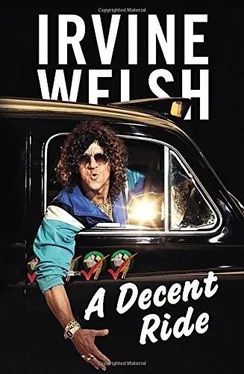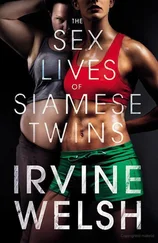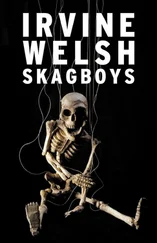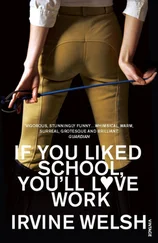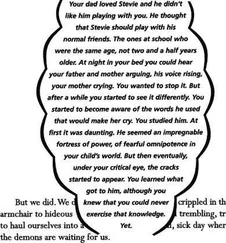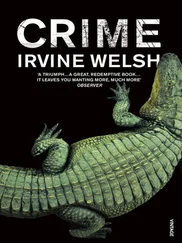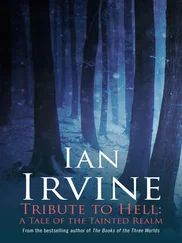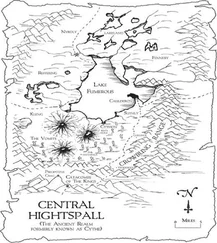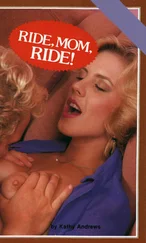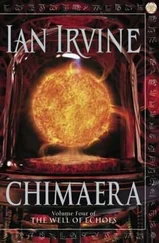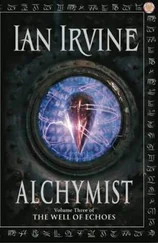— Nae worries, Terry mumbles as he leaves, thinking, he can go and fuck ehsel, him n Suicide Sal are welcome tae each other. He heads outside and gets into the taxi, driving to Broomhouse.
The scheme has been refurbished since the days he’d hung around there, delivering aerated waters from the back of a lorry. It is still a poor area, but the gardens are now discreetly sectioned of with quality metal fencing. He finds Donna’s place, reasoning she would have gotten the ground-floor flat from the council when she had the kid. As he enters the stair, two thin young guys, one sheepish, the other belligerent, are leaving the premises. Donna sees Terry and is surprised. — Ter. . Dad, she says, seemingly more for the benefit of the departing boys than him. — See ye, Drew, Pogo, she says, as they skulk off, tracked in their departure by Terry, who steps into the flat. It smells strongly of nappies. Terry’s spirits sink as he enters the front room to find the detritus of a party, or worse, a lifestyle, that is not going to be good for a child. Empty cans, full ashtrays, pipes and discarded wraps lie strewn across a grubby glass coffee table.
— How ye daein? Donna asks.
With her roundish face, and big, oval eyes, she looks so like her mother, Vivian, his second real love, that Terry briefly feels the air being squeezed from his lungs. — No bad. Thought ah’d swing by, he says, suddenly shamed. — See the bairn, ay.
— Right, Donna says, offering him some tea, which he declines. She goes into another room, and comes back, holding the child. — Just got tae change her, she says, her movements tense and jerky.
The infant is a happy, gurgling soul, gripping Terry’s proferred finger with some power. — So this is the famous Kasey, then, he says, instantly contrite at the blandness of his response.
— Aye, Kasey Linn, Donna says. The television is on, and it’s some local golf tournament. Terry sees Iain Renwick competing and is curious to watch it for a moment or two, but Donna evidently isn’t a golf fan, and switches it off with a display of petulance.
They exchange minimal ritual conversation, both of them weighed down by the ton of words to get through, each too exhausted to begin the process of clearing the mountain of emotional debris between them. When Terry goes to leave he slips her two hundred pounds. — Get something for the bairn, he says. He feels a slack grip on the notes.
Driving in from the west side of the city, Terry wonders what Donna might actually spend the money on. Too engrossed in the cars in front of him, avoiding looking at the pavements in case he sees women, he fails to notice the shuffling gait of wee Jonty MacKay, another man lost in thought.
Jonty is thinking that it would be right if he was imprisoned, if God punished him in that way. But when he goes round the back of the station, and heads for the bridge, he sees that there are no police lines ahead, no evidence that any golden body has been recovered: only workmen going about their tasks. The area remains fenced off but Jonty sees the familiar gap and his wiry frame slips through. A few workmen glance at him as he walks to the end of the half-constructed bridge, and looks down to the base of the iron skeleton of the obelisk where Jinty was dumped. However, this section of the frame is now covered by concrete, held together by wooden boxing and drying and setting into another segment of support stanchion. The workies must have just poured the concrete down into the hole, on top of the duvet-covered Jinty. Jonty’s sparrow head twirls back and forth keenly. Instead of elation, he feels a crushing panic. Oh my God, thuv buried ma wee Jinty intae the huge pillar. It’s no fair.
But then he reasons that he’ll be able tae ride a tram, when they finally come, past this place, to see Jinty. It will be like going to visit a grave, but very fast, and without a talking minister. This notion excites him, and his eyes swivel round trying to work out where the station will be situated, and how much time he’ll have to talk to the pillar.
A hard-hatted, overall-clad yellow-vested foreman approaches him. — Ye cannae stey here, mate. Ye need tae git authorisation.
— When’s it the trams ur gaunny be ready?
— Oh. . naebody really kens that, pal, the foreman says, taking Jonty by the arm and walking him to the exit gate. As he opens it and ushers Jonty out, he taps his metal helmet and points to a sign on the wire-mesh fence. — Yir no allowed in this bit withoot one ay these, n tae git one ay these ye need tae be workin here.
Jonty looks around, a little bemused, then nods slowly and heads down the ripped-up street. The foreman tracks his departure. Another man from the site, who has been observing the exchange, raises an eyebrow. — Boy’s mibbe no aw thaire. Shame, ay.
Jonty continues down Balgreen Road. It’s cold but he doesn’t mind. He likes to draw the frozen air into his lungs, hold it and then exhale with force, seeing if he can make the dragon breath bigger every time. He turns on to Gorgie Road, waving to somebody he thinks he might know who is on the bottom deck of the 22 bus. They turn away. When he gets home the house smells better without Jinty but it isn’t the same. Soon Jonty feels very lonely. When the doorbell suddenly rings he’s both excited and scared.
Through the peephole: a big splash of canary-yellow. It’s Maurice, Jinty’s father. Trembling, Jonty considers pretending that nobody is home, but he realises that he’ll have to face folk eventually. He sucks in a huge breath and opens the door to let Maurice in. — Ah kent it wis you, Maurice. The canary-yellay fleece. Aye.
Maurice seems very upset, dispensing with the pleasantries. — Whaire is she? She’s no phoned, she’s no answerin. . somethin’s up. . this is gittin beyond a joke now, Jonty!
— Ah thoat she wis wi you, Maurice, aye, Maurice, wi you. . Jonty says, and heads into the front room.
Maurice follows in eager pursuit, his thick lenses magnifying his gaze to psychotic proportions. — How would she be wi me?
Jonty now feels closer to prison than ever. He turns to face Maurice’s gaunt, bespectacled face, suddenly envisioning himself sharing a cell with the old jailbird. A half-lie, or a half-truth, spills from his mouth. — Wi fell oot, Maurice, truth be telt, aye, wi hud an argument. . aye sur, thoat she’d be wi you, she jist went oot n nivir came hame, truth be telt. Thoat she be wi you, Maurice, aye sur, sure ah did.
— What did yis faw oot ower? Maurice asks, his nose twitching under the onslaught of the air’s ripe, dark aroma.
— Ah caught her doon that The Pub Wi Nae Name oan the night ay that Bawbag. She wis in the lavvies, wi this other laddie. Daein funny stuff up the nose. Aye sur, funny stuff up the nose.
— Drugs? Maurice’s eyes bulge, reminding Jonty of the snake in The Jungle Book . — Jesus Christ. He flops down on the couch, immediately forced to regret his cavalier abandonment, as a shot spring rips into his buttock. He shuffles his weight in irritation. — Well, she nivir took that oaffay me. Nivir! Ah kent she wis funny wi the fellys, but ah nivir suspected drugs. Thought we’d brought her up wi mair sense than that. .
— Aye sur, funny stuff up the hooter, she did, aye, she did. . Jonty confesses with a heavy heart, feeling like he’s betraying Jinty with this disclosure. He eases himself on to the couch beside Maurice.
— Ma Veronica, God rest her soul, she wis nivir like that, Maurice contends, his moistening eyes adding another glassy layer behind his specs. — No wi drugs, no wi men. He fixes Jonty in a challenging gaze. — She wis pure oan oor weddin night, ye ken.
— Like Jesus?
— Better thin Jesus! Maurice scowls. — Like Jesus’s fuckin ma! Like the Virgin Mary, nivir touched by a man!
Читать дальше
